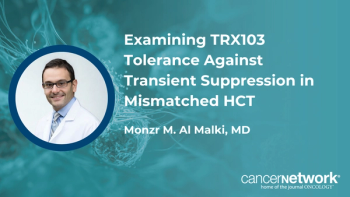
FDA Approves Obinutuzumab for Follicular Lymphoma
The US Food and Drug Administration (FDA) has approved the type 2 anti-CD20 monoclonal antibody obinutuzumab (Gazyva) for patients with follicular lymphoma, a common type of non-Hodgkin lymphoma. The drug has been approved in combination with bendamustine followed by obinutuzumab maintenance for use in patients who are refractory to or have relapsed after treatment with a rituximab-containing regimen.
This new approval is the second indication for obinutuzumab, which was
The FDA based the new approval on the results of the
The trial was stopped early after an interim analysis showed the combination’s efficacy in this patient population. Data from this study showed that patients assigned to obinutuzumab plus bendamustine followed by obinutuzumab maintenance therapy had a 52% improvement in progression-free survival compared with patients assigned to bendamustine monotherapy (hazard ratio [HR], 0.48 [95% CI, 0.34–0.68]; P < .0001). The median progression-free survival had not yet been reached in patients on the obinutuzumab combination compared with 13.8 months for patients assigned bendamustine.
Investigator-assessed progression-free survival showed a median survival of 29.2 months for the combination, more than double the 13.7 months achieved with bendamustine alone (HR, 0.48 [95% CI, 0.35–0.67]; P < .0001).
Although the median overall survival has not yet been reached, a post-hoc analysis with 24.1 months of median observation time has shown that obinutuzumab/bendamustine reduced the risk for death by 38% compared with bendamustine alone (HR, 0.62 [95% CI, 0.39–0.98]), according to a press release from Genentech.
Safety of obinutuzumab was evaluated in an additional 46 patients with marginal zone lymphoma and 28 with small lymphocytic lymphoma. The most common grade 3/4 side effects were febrile neutropenia, neutropenia, infusion-related reactions, sepsis, pneumonia, and pyrexia.
Newsletter
Stay up to date on recent advances in the multidisciplinary approach to cancer.












































